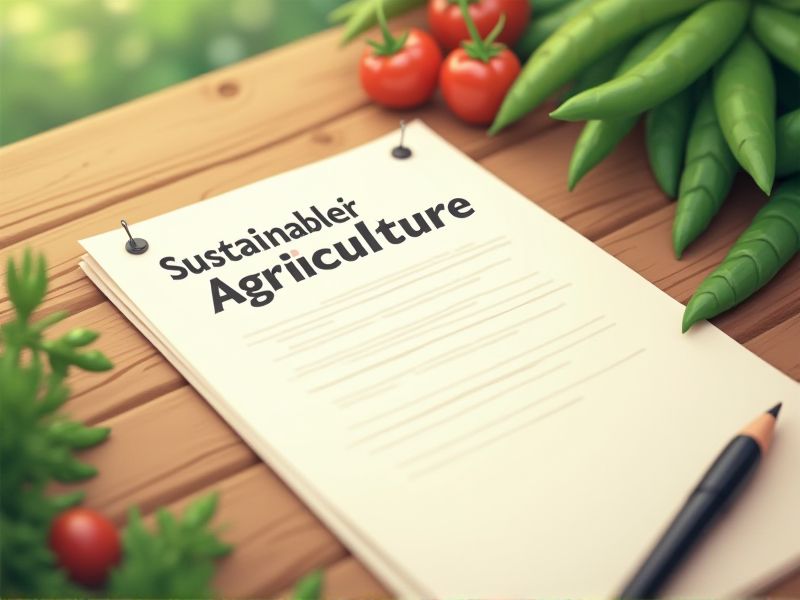
Sustainable agriculture consultants guide farmers and businesses in environmentally friendly and economically viable practices. Specific certifications ensure that consultants stay updated on the latest sustainable techniques and meet industry standards. These credentials provide credibility and build client trust by demonstrating expertise in managing resources efficiently. Consider these important certifications you may need as a Sustainable Agriculture Consultant.
Certified Crop Adviser (CCA)
The involvement of a Certified Crop Adviser (CCA) ensures that sustainable agriculture consultants have the technical expertise necessary to optimize crop production while minimizing environmental impact. Their proficiency in integrated pest management and soil health strategies can lead to healthier ecosystems and reduced reliance on chemical inputs. CCAs possess the knowledge to assist in maximizing resource efficiency, which supports farmers in achieving sustainable yield growth without depleting natural resources. The certification process for CCAs includes rigorous guidelines and continuous education, ensuring that the advice provided is aligned with the latest scientific advancements and sustainability practices.
Certified Professional Agronomist (CPAg)
A Certified Professional Agronomist (CPAg) possesses advanced knowledge in soil management, crop production, and resource conservation, which directly aids in fostering sustainable agricultural practices. Their expertise in analyzing environmental impacts and implementing sustainable techniques can lead to improved soil health and increased crop yields. Employing a CPAg ensures adherence to environmental regulations, minimizing legal risks for agricultural businesses. By providing science-based recommendations, CPAgs contribute to long-term agricultural sustainability and enhanced ecosystem resilience.
Permaculture Design Certificate (PDC)
A Permaculture Design Certificate (PDC) equips a sustainable agriculture consultant with a holistic framework to create efficient systems by understanding natural ecosystems' principles. Knowledge gained through PDC allows consultants to design more resilient agricultural practices, reducing reliance on synthetic inputs like fertilizers and pesticides. With a PDC, consultants can tailor land management strategies that enhance biodiversity and water conservation, vital components of sustainable agriculture. This certification also improves the consultant's credibility, fostering trust with clients seeking eco-friendly agricultural solutions.
Certified Organic Professional (COP)
Certified Organic Professionals possess specialized knowledge of organic farming practices, which directly enhances the consultant's ability to promote sustainability in agriculture. Their expertise helps ensure compliance with organic standards, thereby maintaining the integrity of sustainable practices. This certification equips professionals with strategies to improve soil health and biodiversity, critical components of sustainable agriculture. The designation also builds trust with clients, fostering a reliable advisory relationship that encourages the adoption of eco-friendly techniques.
Regenerative Agriculture Specialist Certification
Regenerative agriculture specialist certification equips consultants with the necessary skills to implement practices that improve soil health and biodiversity. This certification ensures consultants can effectively reduce carbon footprints in agricultural operations by promoting sustainability and environmental stewardship. Certified specialists have the expertise to advise on techniques that increase crop resilience and yield through sustainable methods. Possessing this certification enhances a consultant's credibility and ability to guide farmers towards economically viable and ecologically beneficial practices.
Soil Health Management Certification
Soil Health Management Certification provides consultants with validated expertise, directly enhancing their credibility and effectiveness in sustainable agriculture practices. This certification equips professionals with the latest techniques and methodologies for maintaining soil fertility, vital for long-term agricultural productivity. Increased consumer and regulatory demand for sustainable practices means consultants require in-depth, certified knowledge to meet these expectations. Holding such certification positions consultants as leaders in the field, attracting more clients aiming for sustainability in their agricultural endeavors.
Integrated Pest Management (IPM) Certification
Sustainable agriculture consultants benefit from Integrated Pest Management (IPM) Certification because it ensures they apply eco-friendly pest control methods. By adhering to IPM principles, consultants help reduce chemical pesticide usage, thereby decreasing environmental harm and preserving biodiversity. Certification signals expertise, enhancing the consultant's credibility and trustworthiness with clients focused on sustainable practices. Clients increasingly demand sustainable solutions, so certification aligns consultants with market expectations and promotes environmentally responsible agriculture.
Certified Conservation Planner
Certified Conservation Planners employ data-driven strategies to enhance soil health, reducing the risk of erosion in agricultural lands. Their expertise in resource management leads to improved water quality, essential for sustainable agriculture. Implementing conservation plans can increase biodiversity, encouraging more resilient ecosystems that benefit farm productivity. Knowledge of regulatory requirements ensures compliance, minimizing risks and promoting long-term sustainability in agricultural practices.
Environmental Management System (EMS) Lead Auditor
Having an EMS Lead Auditor ensures compliance with environmental regulations, which is crucial for sustainable agriculture practices. This role aids in identifying environmental risks, allowing for the development of strategies to mitigate adverse impacts on ecosystems. An auditor's expertise in systematic reviews enhances operational efficiency, aligning agricultural practices with sustainability goals. Consistent audits promote transparency and accountability, building trust with stakeholders and consumers in agrarian sectors.
Sustainable Food Systems Certification
Sustainable Food Systems Certification ensures that agriculture consultants are equipped with the necessary knowledge to advise on environmentally friendly practices. This certification provides them with the tools to help farmers reduce their carbon footprint, thereby promoting ecological balance. By having certified consultants, farmers are more likely to adopt sustainable practices that lead to resource conservation and improved soil health. The credibility that comes with certification also builds trust with stakeholders, encouraging investment in sustainable agricultural initiatives.
Summary
By obtaining certifications, you enhance your credibility as a Sustainable Agriculture Consultant. This credibility often leads to increased client trust and engagement in your services. Your certifications also equip you with advanced knowledge and techniques, improving the quality of solutions you propose. As a result, your reputation within the industry likely strengthens, potentially attracting more business opportunities.
